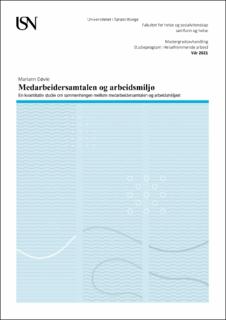Medarbeidersamtalen og arbeidsmiljø
Master thesis
Permanent lenke
https://hdl.handle.net/11250/2831631Utgivelsesdato
2021Metadata
Vis full innførselSamlinger
Sammendrag
Utgangspunktet for denne oppgaven er å undersøke om kommunalt ansatte på Østlandet opplever sammenheng mellom medarbeidersamtalen og arbeidsmiljøet. Denne studien undersøker i hvilken grad medarbeidersamtalen påvirker arbeidsmiljøfaktorene autonomi, medbestemmelse, kollegastøtte, rolleavklaring, rollekonflikt og arbeidspress. Og om de videre har sammenheng med utfallsvariablene engasjement, mening, mestring og overbelastning.
Det er gjennomført en kvantitativ tverrsnittsundersøkelse ved kommunal sektor på Østlandet. Undersøkelsen følger den hypotetisk-deduktive modellen. Spørreskjema ble utarbeidet på bakgrunn av JD-R-modellen og Spreitzer psykologiske empowerment skala (Spreitzer, 1995) , data er samlet og systematisert gjennom SSPS. Videre er det gjort analyser med engasjement, mening, mestring og overbelastning som avhengig variabel. Medarbeidersamtalen og arbeidsmiljøfaktorene autonomi, medbestemmelse, kollegastøtte, rolleavklaring, rollekonflikt og arbeidspress som uavhengige faktorer.
Funn knyttet til medarbeidersamtalen og arbeidsmiljøet drøftes opp imot bl.a. teori om medarbeidersamtalen, arbeidsmiljø, teori fra masterfaget i helsefremmende arbeid. Funnene i undersøkelsen sees også i lys av hva tidligere forskning har vist.
Undersøkelsen viser at medarbeidersamtalen ikke har noen signifikant betydning for arbeidsmiljøet, men at medarbeidersamtalen har sammenheng med medbestemmelse.
Kollegastøtte viste seg å være den arbeidsmiljøfaktoren som var viktigst for jobbrelaterte utfall i denne undersøkelsen. Kollegastøtte hadde sammenheng med både engasjement, mening og mestring. Videre viser denne studien at arbeidsmiljøfaktoren autonomi har sammenheng med utfallsvariablene engasjement og mening. Ser vi på arbeidsmiljøfaktoren rolleavklaring så er det sammenheng med mestring. Jobbkravet rollekonflikt har sammenheng med utfallsvariabelen overbelastning.
Undersøkelsen har i likhet med tidligere forskning og teori vist at det er viktig å skape engasjement, mening og mestring gjennom arbeidsmiljøfaktorene kollegastøtte, autonomi og rolleavklaring dersom organisasjoner vil fremme helse hos ansatte. The primary aim of this dissertation is to investigate whether municipal officials in an organization in Østlandet region experience that there is a link between employee appraisal and the working environment. The research examines the extent to which employee appraisal affects work environment factors autonomy, employee participation, peer support, role clarification, role conflict and work pressure. It continues with the examination of whether work environment factors are related to the outcome variables of commitment, meaning, self-efficacy and work-overload.
A quantitative cross-sectional survey has been carried out at an organization in Østlandet region. The study follows the hypothetical-deductive model. The questionnaire was based on the JD-R model, Spreitzer psychological empowerment skala (Spreitzer, 1995) and the data collected and systematized through SSPS. Furthermore, analysis has been performed with commitment, meaning, self-efficacy and work-overload as dependent variables. The annual appraisal and the work environments factors autonomy, employee participation, peer support, role clarification, role conflict and work pressure were analyzed as independent factors. Finally, regression analyses were performed to determine which variables have the strongest relationship.
Findings related to the annual review and the working environment are discussed based on theory about the employee interview, work environment and theory from the master's course in health promotion work. The findings of the study are also considered in the light of what previous research has shown.
The survey shows that municipal officers at an organization in Østlandet region do not experience that employee appraisal has any significance for the working environment but that the employee appraisal is related to employee participation. Peer support was most important for the work environment in this survey. Peer support was related to both commitments, meaning and self-efficacy. Autonomy was related to meaning and commitment. Role clarification was related to self-efficacy and role conflict showed connection with work-overload.
The survey has, in line with previous theory and research, shown that it is important to create a working environment based on work engagement, meaning and self-efficacy through work environment factors investigated in this survey if organizations want to promote health.
